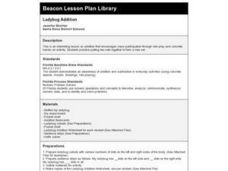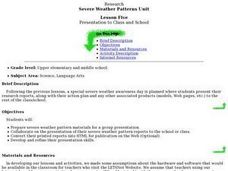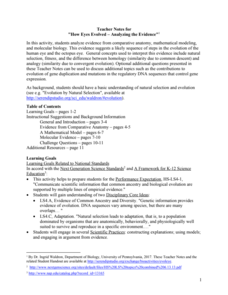Curated OER
Modeling the Keeling Curve with Excel
For this modeling the Keeling Curve worksheet, students use given data beginning in 1960 to create a mathematical model for the changes in atmospheric carbon dioxide over time. Students manipulate the equation to predict the carbon...
Curated OER
Insect Models
Students construct an insect model. In this "insects" science and art lesson, students complete a KWL chart about 'insects," then view several interactive websites to become familiar with insect traits. Students construct an insect model...
Curated OER
Multiplication Strategies - A Day at the Zoo
This is an amazing 33-page resource for teaching multiplication! Your mathematicians will discover the connection between multiplication and repeated addition. They also will work collaboratively with arrays while studying zoo animals....
Baylor College
Modeling an HIV Particle
Models are an important part of science; they help us see the world on a scale that works for us. In the first of five lessons on HIV, learners make a paper model of the HIV virus that is about 500,000 times larger than the actual virus....
BioEd Online
Arm Model
Arm your young scientists with knowledge about anatomy as they build their own model of the elbow joint. Help them get a firm grasp on how muscles and bones interact to allow movement as they try different positions for the muscles on...
Kenan
Respiratory System
Explore the respiratory system with a model. First, pupils build a set of lungs to experiment how they inflate and deflate. Then, they delve deeper into the topic with a web quest to discover new information about the nose, trachea, and...
Curated OER
Mathematical Modeling and Physics
Twelfth graders use a web site to investigate roller coaster physics. In this mathematical modeling lesson, 12th graders are grouped according to their performance on a test. Each group is given an activity to complete on a web site...
Curated OER
Cellular Models
Each student construct a model of a cell on a large cookie, including the parts which were discussed during lecture.? Half of the class will be instructed to make plant cell models and the other half will be in charge of animal cell...
Texas State Energy Conservation Office
Investigation: Waves and Whistles
Wave goodbye to the same old demonstrations for alternative energy sources, and wave hello to this one investigating ocean waves! Using a water bottle to create an oscillating water column, learners see and possibly hear how the...
NOAA
Earth Origami
After reading a brief history of Carl Skalak's journey on the open waters, scholars make a three-dimensional model of the Earth out of an Origami balloon using a printable decorated as the Earth.
Curated OER
Insect Models
Students explore insects and have many opportunities to discuss, reflect, and record their explorations individually and in groups. They then make models of the insects as outlined in the lesson.
Curated OER
Ladybug Addition
Students engage in an interesting lesson on addition that encourages class participation through role-play and concrete hands-on activity. They utilize the fact that ladybugs have dots on their bodies to create a fun, hands-on lesson in...
Curated OER
Slimy Cells
Students create three-dimensional cell models. They may choose to make either a plant or animal cell but must use a Ziploc bag as the cell membrane, slime for the cytoplasm, and strawberry baskets for the cell wall if making a plant...
Curated OER
Presentation to Class and School
How's the weather today? Elementary and middle schoolers plan severe weather awareness day in this lesson on research presentations. They present their research reports, along with their action plan and any other associated products...
Astronomical Society of the Pacific
Getting Ready for the All American Eclipse!
Give your pupils a front row seat at the biggest light show in the sky this year! In addition to admiring the total solar eclipse, young astronomers can explain the phenomenon with a little help from an inquiry-based instructional...
Cold Spring Harbor Laboratory
DNA Is Packaged in a Chromosome
Roger Kornberg, the oldest son of two biochemists, won the 2006 Nobel Prize in Chemistry. Learn about Kornberg and his scientific research with an animation, videos, biography, and an applied problem-solving activity. A summary and...
Curated OER
Blast It! (Learning About Copper)
Opening with background information on copper use and mining, this worksheet assesses junior geologists' reading comprehension. A map activity is available, but the map is not. There is a useful set of vocabulary matching cards and a...
Curated OER
Evidence Revealing the Composition of the Atom
Investigators use indirect evidence to guess what is occupying a sealed box. You could also use a set of plastic Easter eggs to encase the unknown items. Another terrific activity involves having students drop a pencil on a sheet of...
California Academy of Science
Plants: Hanging Tough
Learning about the rainforest can be more fun than you think. The class discusses vocabulary-in-context as they cut cardboard boxes, destined to become part of a rainforest model. Small groups of children color, cut, and construct...
Serendip
How Eyes Evolved – Analyzing the Evidence
Octopodes existed for hundreds of thousands of years before humans, yet our eyes share many similarities. Scholars analyze the evidence to determine if the evolution of eyes best fits a homology or analogy model. They discuss the issue...
Curated OER
Bloodstain Pattern Simulations: A Physical Analysis
Students receive bloodstain pattern evidence from a crime scene. They answer a series of questions through inquiry, observation, measurement, and analysis. Pupils complete this challenge, by reconstructing the evidence through four...
Foundation for Water & Energy Education
What is the Water Cycle? Activity B
Curious physical scientists follow a lesson on the properties of water with this lesson on distillation. They observe a miniature water cycle model that filters dirty water into clean water. These two lessons combined are an enriching...
Serendip
Understanding How Genes Are Inherited via Meiosis and Fertilization
Bring the excitement of genetics to scholars with a dynamic hands-on meiosis modeling experience. During the activity, biologists follow step-by-step procedures to build chromosomes, model independent assortment, learn about crossing...
Curated OER
History of Flight Timeline Activity
Scholars are introduced to the significant events that led to the development of today's modern forms of air travel. They create a timeline to identify the vital events that are related to man's flight. In addition, they research various...























